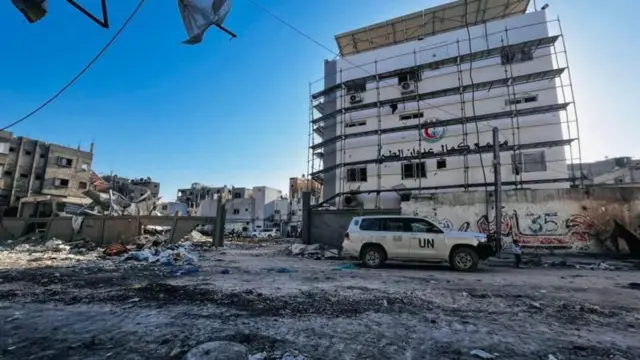
image source, Getty Images
Hossam Abu Safiya, director of Kamal Adwan Hospital in the northern Gaza Strip, issued an urgent distress call a short while ago as a result of the hospital being subjected to artillery shelling and direct fire from Israeli tanks, according to him, without prior warning.
He confirmed in an audio recording he sent to local news groups that bullets and fire had penetrated the walls of the various departments, including the intensive care department, the reception department, and the children’s nurseries, and that they had caused serious damage and several injuries.
He described the attack as unprecedented and unnatural, explaining that medical teams are gathering in one place in difficult situations, and that what is happening is a continuation of the series of killings, and he appealed to the world to put pressure and stop everything that is happening.
For its part, the Ministry of Health in Gaza said in an urgent statement that there is currently an intense and very violent bombardment on the hospital, occurring in an unprecedented manner and without any prior warning on the care and nursery department.
She indicated that the bombing is carried out with bombs, explosives, and tank fire, directly targeting hospital departments while the crews and patients are present inside the hospital departments.
The ministry held “the world responsible for what is happening,” demanding that it assume its responsibilities towards the suffering of the people of Gaza, adding that they are being attacked in front of everyone’s eyes, while the entire world watches without anyone interfering.
The Palestinian News Agency “Wafa” also reported that, on Saturday, Israeli forces blew up several residential buildings in Rafah, south of the Gaza Strip, in conjunction with gunfire from helicopters, according to what the agency reported.
In non-final statistics for war victims in the Gaza Strip, according to figures from the Palestinian Ministry of Health, the number of deaths reached 45,227, the majority of whom were women and children, while the injuries reached 107,573. “Thousands of victims are still under the rubble and on the roads, and ambulance and rescue crews cannot reach them.” “, according to the ministry.
Israel announces the interception of a drone after the Houthis targeted an area in Tel Aviv
The Israeli army announced that it intercepted, on Saturday, inside the country’s airspace a drone coming from the east, hours after 16 people were slightly injured in Tel Aviv as a result of a missile launched by the Ansar Allah Houthi group from Yemen.
The army said in a statement, “Following the sirens that sounded a short while ago in Gvulot, Talmi Eliyahu, and Ein Habsor (near the Gaza Strip) to warn of the infiltration of a drone, the Israeli Air Force intercepted a drone that crossed into Israeli territory from the east.”
In the early hours of Saturday morning, the Ansar Allah Houthi group targeted an area in Tel Aviv with a “Palestine 2” hypersonic ballistic missile, and the group confirmed in a statement that “the attack represents the targeting of an Israeli military target.”
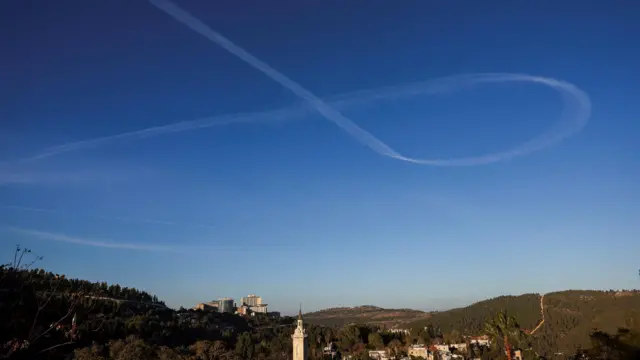
image source, Reuters
The Ansar Allah group’s military spokesman, Yahya Saree, said in a televised statement that the group’s missile forces “successfully” targeted an Israeli military facility, in another attempt to launch a long-range attack against Israel.
Sarie added in his statement, which was reported by Reuters, that the missile “accurately hit its target, and the defense and interception systems failed to confront it.”
This announcement comes two days after the Israeli bombing of ports and energy infrastructure belonging to the Houthis in Yemen, more than 1,500 kilometers south of Israel, which left nine people dead, according to the Houthis.
For its part, the Israeli army announced that it “failed to intercept a missile from Yemen early Saturday” that fell in the Tel Aviv-Jaffa area, and the ambulance service said that 16 people were slightly injured, in addition to material damage.
The service stated in its statement that “the teams provided medical care to 16 individuals who sustained minor injuries due to glass fragments from shattered windows in nearby buildings as a result of the impact of the strike.”
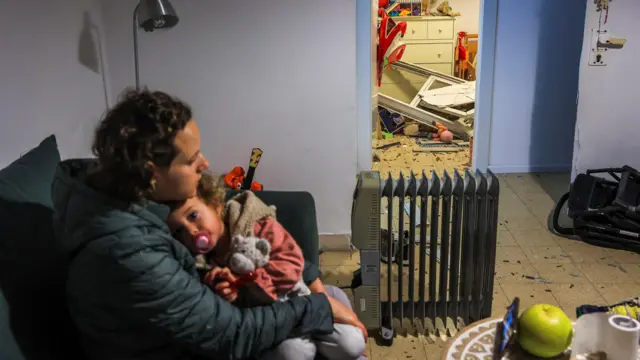
image source, Sinai Koren
“I was at home and heard a strong explosion. I immediately went to the scene and saw major damage resulting from the explosion in the neighboring buildings,” according to what the French news agency quoted an Israeli paramedic.
This Houthi attack on a military target is the second of its kind within days, despite a warning issued by Israeli Prime Minister Benjamin Netanyahu to the Houthis a few days ago in which he declared that “whoever strikes Israel will pay a heavy price.”
The Houthi spokesman pledged on Saturday to continue operations “until the aggression stops and the siege on the Gaza Strip is lifted.”
Palestinian factions: A ceasefire agreement in Gaza is “as close as possible”
In Cairo, the leaders of the Hamas, Islamic Jihad, and Popular Front for the Liberation of Palestinians discussions on Friday discussed developments in the ceasefire negotiations and the hostage and prisoner exchange deal with Israel, according to a statement issued by Hamas on Saturday.
In its statement, the movement reiterated that the possibility of reaching an agreement is closer than ever if Israel stops setting new conditions.
The movement added that the three factions agreed to meet again at the earliest opportunity to complete what was required in order to put the final touches on forming a community support committee to manage the Gaza Strip after the war.
No statements or statements were issued by the Egyptian side regarding the meeting of the three factions in Cairo, at a time when Arab and foreign media reports were reported from various sources during the past two days about the presence of obstacles in the course of negotiations aimed at achieving a new exchange deal and a ceasefire in Gaza, despite what was reported. Previously about a possible breakthrough.
The discussions were renewed in the Qatari capital, Doha, last week, amid reports of progress in narrowing the gap between Israel and Hamas, and the CIA Director left Doha without announcing any progress on this path.
The meeting of the three factions in Cairo comes two weeks after the Fatah movement announced its rejection of the proposal to form a “Community Committee to Support the Gaza Strip,” which Egypt presented to the Palestinian factions during meetings that took place in Cairo in the past few weeks.
Fatah leader Abdullah Abdullah said in a press statement on December 8 that his movement, after in-depth discussion, officially informed Egypt of its rejection of the proposal to form a “support committee.” Because, from her point of view, “it perpetuates the division between the two parts of the country, the Gaza Strip and the West Bank,” according to “Sanad News Agency.”
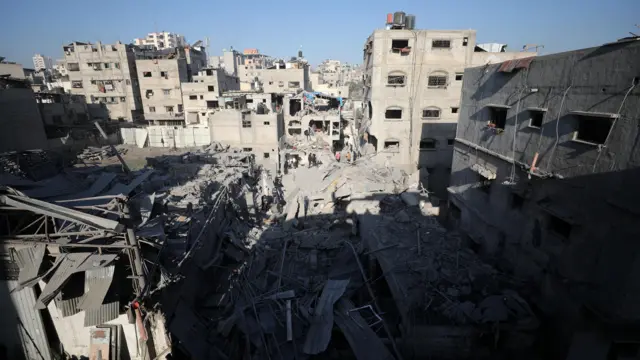
image source, Reuters
The Israeli Broadcasting Authority reported that Israel requires, within the framework of the exchange deal negotiations, “not to release senior Palestinian prisoners to the occupied West Bank, but rather to transfer them abroad.”
The authority quoted an Israeli official as confirming that there had been progress in the talks, noting that they were “moving in the right direction.”
Despite the cautious optimism surrounding these negotiations, the American newspaper “The Washington Post” reported that the American mediator left Doha to return to the United States after only one day of the discussions.
A source from the American delegation confirmed that the main obstacles to reaching an agreement include the number of hostages who will be released in the first phase, in addition to the identity of the Palestinian prisoners included in the release.
There are still outstanding issues between the two parties, the most prominent of which are: The Israeli withdrawal from the Gaza Strip, the return of the displaced to the north of the Strip, the management of the crossings, and the future of governance in Gaza after the agreement.
In the same context, Israeli Channel 12 reported that some families of Israeli hostages had received indications about the possibility of reaching a preliminary agreement with Hamas within the next ten days.
The channel added, citing informed sources, that the list of Palestinian prisoners who will be released in the first phase has “been completed.”
Majdalani calls on the parties participating in the International Socialist Conference to “protect and implement the two-state solution”
Today, Saturday, the Secretary-General of the Palestinian Popular Struggle Front and member of the Executive Committee of the Palestine Liberation Organization, Ahmed Majdalani, called on the parties participating in the International Socialist Conference held in the Moroccan capital, Rabat, to take the necessary measures and steps to protect and implement the two-state solution, especially the ruling parties, led by them. Prime Minister of Spain Pedro Sanchez.
During his speech before the conference, Majdalani thanked Sanchez for his initiative with a number of European countries to recognize the Palestinian state on the borders of June 4, 1967, in accordance with international legitimacy resolutions, and to work with all countries to ensure that Palestine obtains its natural right to be a full member of the United Nations. Like all other peoples and countries.
“All roads in Gaza lead to death”
Louise Waterridge, emergency official at the United Nations Relief and Works Agency for Palestine Refugees (UNRWA), confirmed that more than two million people are still trapped in Gaza under tragic conditions, deprived of basic needs amid deteriorating conditions.
“The population cannot escape, and it seems that every path leads to death,” Waterdridge said, referring to the worsening human suffering in the region.
For its part, the United Nations Children’s Fund (UNICEF) called on the international community to bear collective responsibility to end the suffering of children in Gaza, as the war is a “war on children”, who bear the greatest brunt of “brutal violations” of their rights, according to the organization.
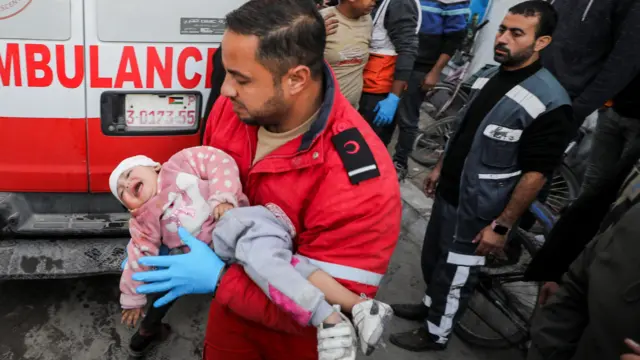
image source, Reuters
Rosalia Bolin, the organization’s communications officer, indicated that more than 14,500 children were killed in the war, while many of them still suffer from injuries and destruction.
With the advent of winter, children suffer from the extreme cold while they are barefoot, while many of them are still wearing summer clothes, according to Pauline.
UNICEF said that children are searching among the rubble for pieces of plastic to burn to keep warm, amid the spread of diseases in light of the lack of health services and continuous attacks on hospitals.
On the other hand, the United Nations Relief and Works Agency for Palestine Refugees (UNRWA) confirmed that the humanitarian situation is becoming more difficult with the deteriorating weather conditions, as the agency is facing difficulty in providing basic aid, with food supplies abroad waiting to enter the Strip for six months, forcing Humanitarian workers have to make difficult decisions between providing food or shelter to besieged populations.

